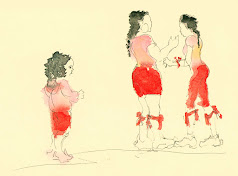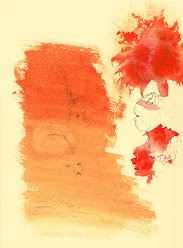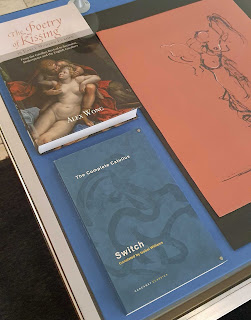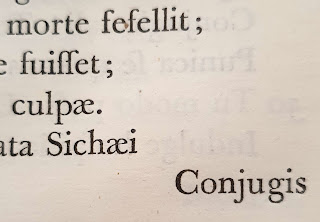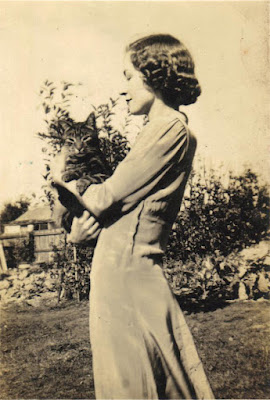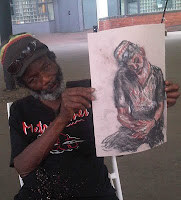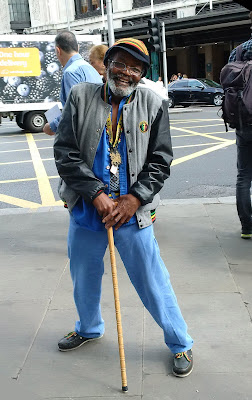 |
| Tenshiko tied by Kirigami |
I’d never heard of Japanese rope bondage (aka shibari, Japanese for ‘to tie’) until a chance meeting led me to draw in a club
for performing this elaborate and consensual pursuit. Its fluctuations between dominance and submission gave me a setting for my translations of Catullus, the poet of hating and wanting.
Some of my shibari drawings are on show throughout Michaelmas 2023
in the lobby of the Institute of Classical Studies, Senate
House, London. The exhibition leaflet is here.
Showcase 1
Being a top (the one who ties) is about humility. Being a
bottom is about power. Odysseus takes rope-bottoming to extremes, putting
others in harm’s way for his own gratification. Troy: myth and reality lies open at three images of Odysseus
bound to the mast so that he can safely hear the Sirens.
Catullus launched an infinity of kiss poems, some of them here: The Poetry of Kissing in Early Modern
Europe: From the Catullan Revival to Secundus, Shakespeare and the English
Cavaliers by Alex Wong.
The cover of my Switch: The Complete Catullus is held in place with tiny magnets so
that it won’t curl in the showcase. The Senior Conservator at Senate House
Library, Salvador Alcántara Peláez, set up the
exhibition with his ingenious bag of tricks, and made something coherent out of my doomed theoretical layout.
Showcase 2
Paul Jackson, Deputy Librarian at the Institute of Classical
Studies, administers the Hellenic and Roman Library’s rare books. He supplied a
beautiful C. Valerii Catulli Opera combined with Propertius and Tibullus
(Paris, 1685). At his suggestion it lies open at poem 8, ‘Miser Catulle…’, in
which the poet unconvincingly orders himself to get over his failed affair with
his nemesis, Lesbia.
The human condition makes bondage a powerful metaphor. I chose
two poems to illustrate this and Lucy Evans, Head of Collections at Senate
House Library, selected exquisite rare books in response to my brief: ‘small’.
Poems, &c. by John Donne, late Dean of St. Pauls
(Henry Herringman, 1669)
Holy Sonnet XIV Batter my heart, three-person'd God; for you
As yet but knock, breathe, shine, and seek to mend;
That I may rise and stand, o'rthrow me, and bend
Your force, to break, blow, burn, and make me new.
I, like an usurpt Town to another due,
Labour to admit you, but oh, to no end;
Reason your Viceroy in me, me should defend,
But is captiv'd, and proves weak or untrue.
Yet dearly I love you and would be lov'd fain,
But am betroth'd unto your enemy;
Divorce me, untie, or break that knot again,
Take me to you, imprison me, for I
Except you enthral me, never shall be free,
Nor ever chaste, except you ravish me.
From Hesperides, or, The works both humane & divine
of Robert Herrick, Esq. (John Williams and Francis Eglesfield, 1648):
The Braclet to Julia.
Why I tye about thy wrist,
Julia, this my silken twist;
For what other reason is't
But to shew thee how in part,
Thou my pretty Captive art?
But thy Bondslave is my heart:
’Tis but silke that bindeth thee,
Knap the thread, and thou art free:
But ’tis otherwise with me;
I am bound, and fast bound so,
That from thee I cannot go;
If I co’d, I wo’d not so.
Showcase 3
 |
| Miss Bones tied by Fred Hatt |
Catullus was often censored. Richard Espley, now Chief Librarian at the National Art Library in
the V&A, advised me to look in Senate House Library’s Craig Collection.
The British writer and poet Alec Craig (1897-1973) amassed
books on sexuality and erotica, including banned or censored works. I picked Le Livre d’amour des anciens (Bibliothèque
des Curieux, Paris, 1912), open at anonymous French translations of Catullus –
including, in poem 32, a comparatively chaste ‘prépare-toi
à me reçevoir neuf fois de suite dans tes bras’ where Catullus promises nine
frank ‘fututiones’.
Swinging Catullx contains
gender-fluid versions of Catullus based in Dr Maureen Almond’s Teesside, where
she also locates Horace. Living Classics: Greece and Rome in contemporary
poetry in English edited by S.J. Harrison is open at her
version of Horace Epode 2, pervaded by the menace of pigs’ trotters.
Andrea Brady’s Poetry and Bondage: A History and Theory of Lyric
Constraint focuses on the works of
people who are imprisoned, enslaved or oppressed.
Showcase 4
Catullus influenced Virgil. Paul Jackson produced a first edition of the Baskerville Virgil,
Publii Virgilii Maronis Bucolica, Georgica et Æneis, printed in
Birmingham in 1757. Recalling our A-Levels, we agreed to show Aeneid,
Book 4.
John Baskerville (1706-75) asked James Whatman the Elder
(1702-59) to make a new ultra-smooth wove paper, facilitating the ‘kiss
impression’ – the lightest possible pressure of printing on the surface – required
by the detail of his Baskerville font.
Virgil influenced Dante. B (After
Dante) (Carcanet) is an acclaimed interpretation by Ned Denny.
‘Hands tied behind with living ropes that reared to hiss
at their loins where head and tail were knotted tight’
Shibari performance usually involves suspension. Plato
describes a chain of artistic suspension in Ion: ‘One poet is suspended
from one Muse, another from another: the word we use for it is
“possessed,” but it is much the same thing, for he is held. And from these
first rings — the poets — are suspended various others, which are thus
inspired, some by Orpheus and others by Musaeus; but the majority are possessed
and held by Homer.’
Open at this passage is Plato: The Statesman, Philebus
(translation by Harold N. Fowler); Ion (translation by W.R.M. Lamb),
Loeb 164, 1925.
With thanks to Joanna Ashe and Paul Jackson of the
Hellenic and Roman Library/Institute of Classical Studies, and Lucy Evans and
Salvador Alcántara Peláez of Senate House Library.





